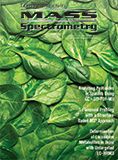Preview of the 67th Conference on Mass Spectrometry and Allied Topics
Special Issues
We present a brief preview of this year’s ASMS conference, taking place June 2–6, 2019, in Atlanta, Georgia.
The 67th Conference on Mass Spectrometry and Allied Topics is set to take place June 2–6 at the Georgia World Congress Center in Atlanta, Georgia.
Sunday Events
On Sunday, four tutorial lectures will be given, in two sessions, both starting at 5:00 pm. Tutorial Session I will be chaired by Susan Richardson of the University of South Carolina. Stephen Blanksby of Queensland University of Technology. Gavin Reid of the University of Melbourne will present the first lecture, on lipodomics. At 5:45 pm, Enrico Davoli of the Mario Negri Institute will present the second tutorial, on targeted imaging.
Erin Baker of North Carolina University will chair Tutorial Session II from 5:00 pm to 6:30 pm. "Native Mass Spectrometry" is the topic of the first tutorial, presented by Michal Sharon of the Weizmann Institute. Following that talk, "Data-Independent Acquisition" will be presented by Birgit Schilling of The Buck Institute.
The tutorials are followed by the conference opening plenary lecture at 6:45 pm. Mark Z. Jacobson of Stanford University will present a talk titled "Transitioning the World Energy for All Purposes to Stable Electricity Powered by 100% Wind, Water, and Sunlight."
A welcome reception will follow the plenary lecture, taking place from 7:45 pm until 9:00 pm in the Poster and Exhibit Hall.
Monday Award Presentations
Jefferey Shabanowitz will receive the Al Yergey Mass Spectrometry Scientist Award Monday at 4:45 pm. The award recognizes dedication and significant contributions to mass spectrometry-based science by "unsung heroes." Shabanowitz played a major role in the development of peptide sequence analysis by tandem mass spectrometry.
The John B. Fenn Award for a Distinguished Contribution in Mass Spectrometry will then be presented to John R. Yates III of The Scripps Research Institute. The award recognizes Yates for his development of automated, large-scale interpretation of peptide tandem mass spectral data. His SEQUEST algorithm laid a critical foundation for the field of proteomics and has enhanced the accuracy and effectiveness of mass spectrometry for understanding important biological and clinical questions. Yates will then give an award lecture.
Tuesday Award Presentation
The Biemann Medal will be awarded to Sarah Trimpin of Wayne State University at 4:45 p.m. The Biemann Medal is awarded to an individual early in his or her career to recognize significant achievement in basic or applied mass spectrometry. Trimpin's award is for unusual observation of highly charged protein ions in an atmospheric pressure MALDI experiment that led to her discovery that ionization occurs simply bypassing compounds through the inlet of a mass spectrometer.
Thursday Plenary Lecture
On Thursday, Lilly D'Angelo of Global Food & Beverage Technology Associates will give a plenary lecture at 4:45 p.m. titled "Chemistry of Food and Soft Drinks."
Closing Event
A closing event at the Georgia Aquarium gets under way at 6:30 pm on Thursday. Tickets must be purchased in advance by noon Monday. The ticket cost is $40 per person and includes a dinner buffet, open until 8:00 pm, with dessert and a cash bar available until the close of the event, at 9:30 pm. Tickets also include one drink per ticket for soda, beer, or wine.
ASMS 2020
The 68th Annual ASMS Conference will be held May 31–June 4 in Houston, Texas. For more information, visit www.asms.org.
Cindy Delonas is the Associate Editor for Spectroscopy and LCGC North America. Direct correspondence to CDelonas@MMHGroup.com

Determining Enhanced Sensitivity to Odors due to Anxiety-Associated Chemosignals with GC
May 8th 2025Based on their hypothesis that smelling anxiety chemosignals can, like visual anxiety induction, lead to an increase in odor sensitivity, a joint study between the University of Erlangen-Nuremberg (Erlangen, Germany) and the Fraunhofer Institute for Process Engineering and Packaging (Freising, Germany) combined behavioral experiments, odor profile analysis by a trained panel, and instrumental analysis of odorants (gas chromatography-olfactometry) and volatiles (gas chromatography-mass spectrometry).
Investigating 3D-Printable Stationary Phases in Liquid Chromatography
May 7th 20253D printing technology has potential in chromatography, but a major challenge is developing materials with both high porosity and robust mechanical properties. Recently, scientists compared the separation performances of eight different 3D printable stationary phases.
Detecting Hyper-Fast Chromatographic Peaks Using Ion Mobility Spectrometry
May 6th 2025Ion mobility spectrometers can detect trace compounds quickly, though they can face various issues with detecting certain peaks. University of Hannover scientists created a new system for resolving hyper-fast gas chromatography (GC) peaks.

.png&w=3840&q=75)

.png&w=3840&q=75)



.png&w=3840&q=75)



.png&w=3840&q=75)






